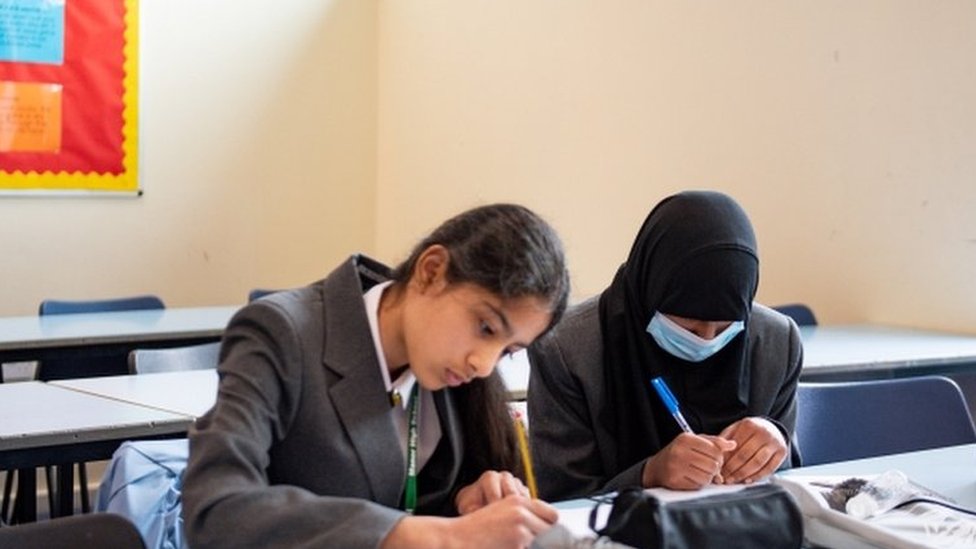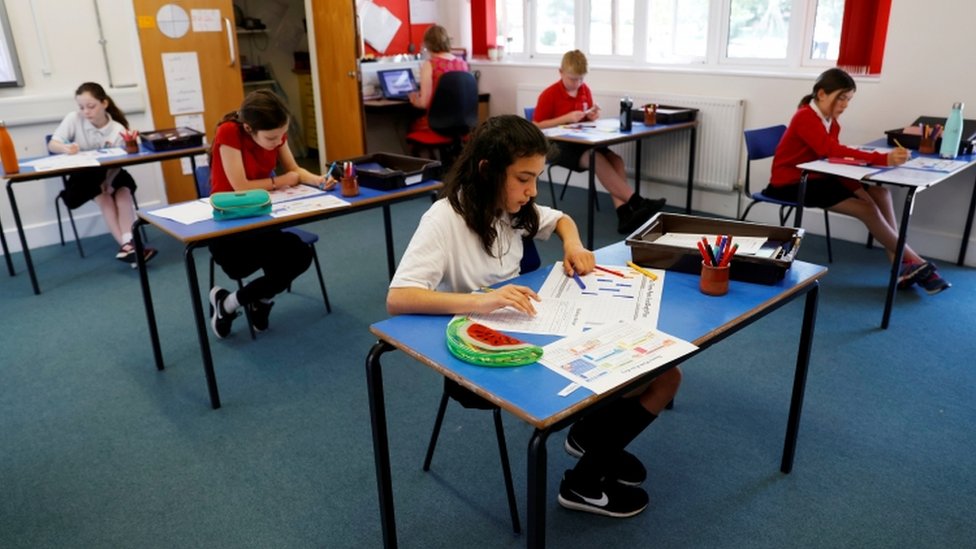
Education Secretary Gavin Williamson told the Commons that exam-year pupils would return a week earlier than their schoolmates in the week of 11 January.
In the meantime, schools will have more time to set up mass testing plans.
In a few areas with the highest infection rates, primaries would remain closed temporarily, he added.
The areas where primary schools would remain closed are: most of London, much of Essex and Kent, Hasting and Rother in East Sussex, Milton Keynes and parts of Hertfordshire.
Mr Williamson said the temporary school shutdowns would cut chains of transmission. Primary closures would be reviewed every two weeks.
But teaching unions said the move did not go far enough, and one labelled it another "last-minute mess". They have been calling for a working test-and-trace system since before schools returned from the lockdown in September.
The move comes after most of England was put into the toughest Tier 4 restrictions, and follows warnings from medics about pressure on hospitals - and from government scientists about the increasing contagiousness of the new strain of coronavirus.
Mr Williamson said the delay in reopening secondary schools would allow head teachers to develop and set up mass testing plans for their pupils.
"In the face of a rapidly changing situation, I am determined to act to preserve lives and the NHS, as we continue to protect education and put children first.
"We are making changes to the start of term to give more time for the rollout of our first of its kind rapid testing programme, to identify students who have the virus but don't display any symptoms."
But Kate Green, Labour shadow education secretary, said: "Only days before many schools should have been opening again to all pupils, the secretary of state has announced that many will not be returning as planned.
"This delay and disruption to children's education is a direct result of the government's failure. They've lost control of the virus. Now they're losing control of children's education."
Her Labour colleague, Yvette Copper, said schools in her constituency had received no support or allocation of funding, and no contact from the military, which has been organising testing in some schools.
She added: "They all want to do this mass testing but the support they are getting is always too late, too chaotic."
High Covid rates
But Mr Williamson said the testing programme would help keep education settings as safe as possible for all students.
"Because Covid infection rate is particularly high among this age group," he said, "we are going to allow more time so that every school and college is able to fully roll out testing for their pupils and staff.
"This kind of mass testing will help protect not just children and young people, but benefit everyone in the community.
"It will break those chains of transmission that are making infection rates shoot up."
The primary schools affected would be reopened as soon as possible, Mr Williamson said, adding that testing for primary school staff would follow in January.
'Last-minute mess'
It is a significant step, as ministers have repeatedly stated that schools would remain open - and even threatened council areas which wanted to close their schools early for Christmas with legal action.
The general secretary of the Nasuwt teachers' union, Patrick Roach, said the announcement offered belated clarity but did not go far enough.
"Stronger preventative action is needed to limit the further transmission of the coronavirus in schools and colleges, including enabling the greater use of remote and blended learning which would enable effective social distancing, which is vital to minimising virus transmission."
The leader of the National Association of Head Teachers, Paul Whiteman, said: "This is another last-minute mess which could so easily have been avoided if the government had listened to school leaders before the holidays.
"Instead, back then, schools which wanted to shift to remote learning were threatened with legal action. Now we have a situation where the government is instructing schools to reduce the amount of teaching time available.
"If we'd had the freedom to take action before the holidays, we might have been in a position to have more schools open for more pupils. School leaders will be baffled, frustrated and justifiably angry tonight."

Schools were struggling to remain Covid-safe during the autumn term, despite the intense efforts of teachers and staff, with huge numbers of pupils contracting the virus and then being sent home.
All primary schools had been due to fully reopen on 4 January, along with secondary schools opening for vulnerable children and those sitting exams this year (Years 11 and 13).
Remaining secondary school pupils were to start term working remotely from home.
Effectively, the whole process has been shunted back a week. This is two weeks after the usual start of term.
Full list of areas where primary schools will remain closed at the start of term
London: Barking and Dagenham; Barnet; Bexley; Brent; Bromley; Croydon; Ealing; Enfield; Hammersmith and Fulham; Havering; Hillingdon; Hounslow; Kensington and Chelsea; Merton; Newham; Richmond-Upon-Thames; Southwark; Sutton; Tower Hamlets; Waltham Forest; Wandsworth and Westminster.
Essex: Brentwood; Epping Forest; Castle Point; Basildon; Rochford; Harlow; Chelmsford; Braintree; Maldon; Southend on Sea and Thurrock.
Kent: Dartford; Gravesham; Sevenoaks; Medway; Ashford; Maidstone; Tonbridge and Malling; Tunbridge Wells and Swale.
East Sussex: Hastings and Rother.
Buckinghamshire: Milton Keynes.
Hertfordshire: Watford, Broxbourne, Hertsmere and Three Rivers.

- SCHOOLS: What will happen if children catch coronavirus?
- SOCIAL DISTANCING: Can I give my friends a hug?
- LOOK-UP TOOL: How many cases in your area?
- LOCKDOWN LOOK-UP: The rules in your area

How are the other UK nations returning to school?
- Scotland: Schools will start term on 11 January, with learning taking place online until at least 18 January.
- Wales: Term will start with online learning, but the majority of pupils are expected to resume face-to-face lessons by 11 January. A full return to the classroom is expected to be completed by 18 January.
- Northern Ireland: All schools will initially reopen for face-to-face teaching at the start of term, but years 8 to 10 will move to remote learning from 25 January for at least two weeks.
Schools in all the UK nations are remaining open for vulnerable children. England, Wales and Scotland have also committed to maintaining face-to-face teaching for children of key workers.

- FILMS FOR EVERYONE: Check out what films are streaming now on BBC iPlayer
- IDRIS ELBA MEETS PAUL McCARTNEY: Listen to the exclusive interview now...


Do you work in a school? Will you be affected by mass testing in schools? Email haveyoursay@bbc.co.uk.
Please include a contact number if you are willing to speak to a BBC journalist. You can also get in touch in the following ways:
- WhatsApp: +44 7756 165803
- Tweet: @BBC_HaveYourSay
- Please read our terms & conditions and privacy policy
If you are reading this page and can't see the form you will need to visit the mobile version of the BBC website to submit your question or comment or you can email us at HaveYourSay@bbc.co.uk. Please include your name, age and location with any submission.
"term" - Google News
December 31, 2020 at 01:14AM
https://ift.tt/3b7mThp
Covid: Secondary school new term delayed by two weeks - BBC News
"term" - Google News
https://ift.tt/35lXs52
https://ift.tt/2L1ho5r
Bagikan Berita Ini

















0 Response to "Covid: Secondary school new term delayed by two weeks - BBC News"
Post a Comment